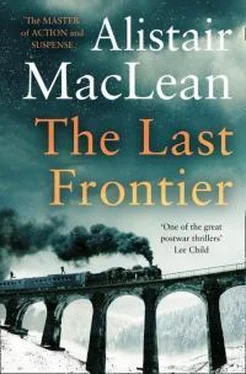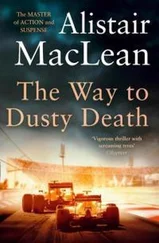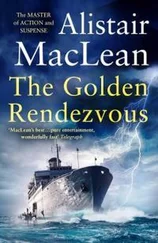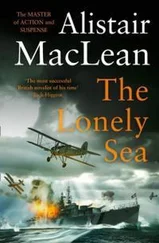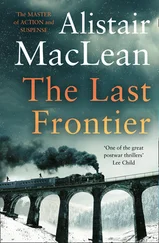Алистер Маклин - The Last Frontier
Здесь есть возможность читать онлайн «Алистер Маклин - The Last Frontier» — ознакомительный отрывок электронной книги совершенно бесплатно, а после прочтения отрывка купить полную версию. В некоторых случаях можно слушать аудио, скачать через торрент в формате fb2 и присутствует краткое содержание. Год выпуска: 2012, Издательство: Sterling, Жанр: Шпионский детектив, на английском языке. Описание произведения, (предисловие) а так же отзывы посетителей доступны на портале библиотеки ЛибКат.
- Название:The Last Frontier
- Автор:
- Издательство:Sterling
- Жанр:
- Год:2012
- ISBN:нет данных
- Рейтинг книги:3 / 5. Голосов: 1
-
Избранное:Добавить в избранное
- Отзывы:
-
Ваша оценка:
- 60
- 1
- 2
- 3
- 4
- 5
The Last Frontier: краткое содержание, описание и аннотация
Предлагаем к чтению аннотацию, описание, краткое содержание или предисловие (зависит от того, что написал сам автор книги «The Last Frontier»). Если вы не нашли необходимую информацию о книге — напишите в комментариях, мы постараемся отыскать её.
The Last Frontier — читать онлайн ознакомительный отрывок
Ниже представлен текст книги, разбитый по страницам. Система сохранения места последней прочитанной страницы, позволяет с удобством читать онлайн бесплатно книгу «The Last Frontier», без необходимости каждый раз заново искать на чём Вы остановились. Поставьте закладку, и сможете в любой момент перейти на страницу, на которой закончили чтение.
Интервал:
Закладка:
Alistair MacLean
THE LAST FRONTIER
1959
Alistair MacLean
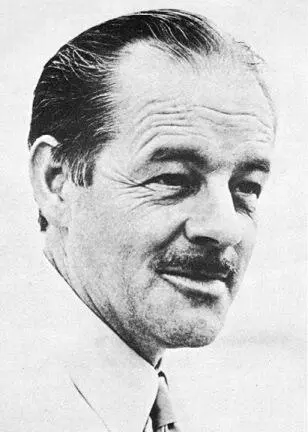
Alistair MacLean, the son of a Scots minister, was brought up in the Scottish Highlands. In 1941, at the age of eighteen, he joined the Royal Navy. After the war he read English at Glasgow University and became a schoolmaster. The two and a half years he spent aboard a wartime cruiser were to give him the background for HMS Ulysses , his remarkably successful first novel, published in 1955. He is now recognized as one of the outstanding popular writers of the 20th century, the author of twenty-nine worldwide bestsellers, many of which have been filmed, including The Guns of Navarone, Where Eagles Dare, Fear is the Key and Ice Station Zebra . In 1983, he was awarded a D.Litt. from Glasgow University. Alistair MacLean died in 1987.
To Gilleasburg
ONE
The wind blew steadily out of the north and the night air was bitterly chill. Nothing moved across the snow. Under the high cold stars the frozen plain empty, desolate, stretched endlessly away on every side until it vanished into the blurred distance of an empty horizon. Over everything lay the silence of death.
But the emptiness, Reynolds knew, was illusion. So was the desolation and the silence. Only the snow was real, the snow and that bone-deep, sub-zero cold that shrouded him from head to toe in a blanket of ice and continuously shook his entire body in violent, uncontrollable spasms of shivering, like a man suffering from ague. Perhaps that feeling of drowsiness that was beginning to creep over him was only an illusion also, but he was aware that it, too, was no illusion, it was real and he knew only too well the meaning it carried with it. Resolutely, desperately almost, he crushed down all thought of the cold, the snow and sleep, and concentrated on the problem of survival.
Slowly, painstakingly, careful to make not the slightest unnecessary sound or movement, he slid one frozen hand under the lapels of his trench-coat, fumbled his handkerchief out of his breast pocket, rolled it into a crushed ball and stuffed it into his mouth: betrayal of his position could come only by sight or sound, and the folds of the handkerchief would break up the heavy condensation of his breath in the frosty air and muffle the chattering of his teeth. Then he twisted round cautiously in the deep, snow-filled ditch by the roadside into which he had fallen, reached out an exploratory hand – now curiously mottled blue and white by the cold – for the trilby hat that had been knocked from his head when he had tumbled off the overhanging branch of the tree above him, found it and inched it slowly towards him. As thoroughly as his numbed, now almost useless fingers would permit, he covered crown and brim with a thick layer of snow, crammed the trilby deep over the giveaway black thatch of his head and lifted head and shoulders in almost grotesque slow motion until first the hat brim and then the eyes cleared the level of the ditch.
In spite of its violent shivering, his whole body was as taut as a bow-string as he waited, in tense, sickening expectation, for the shout that betokened discovery, or the shot or the numbing crash that carried oblivion with it as a bullet found the exposed target of his head. But there was no sound, no shot and his awareness only heightened with the passing of every moment. His first quick scanning of the circuit of the horizon was now complete, and there could be no doubt about it: there was no one there, at least close at hand, either to see or to be seen.
Moving just as carefully, just as slowly, but with a long drawn-out easing of his pent-up breath, Reynolds straightened until he was kneeling upright in the ditch. He was cold and shivering still, but was no longer aware of it, and the sleepiness had vanished as if it had been a dream. Once again his gaze travelled in a full circle around the horizon, but slowly, probingly, this time, the keen brown eyes missing nothing, and once more the answer was the same. There was nobody to be seen. There was nothing to be seen, nothing at all but the icy twinkle of the stars in the dark velvet of the sky, the level white plain, a few small isolated groves of trees and the curving ribbon of road beside him, its surface hard-packed by the snow-treads of heavy trucks.
Reynolds lowered himself back down into the deep trench which the impact of his falling body had carved out in the drifted snow in the ditch. He had to have time. He had to have time to recover his breath, to ease his still gasping lungs’ demands for air and more air: a scant ten minutes had passed since the truck in which he had stolen a lift had been stopped by the police block, and the brief, fierce scuffle, clubbed automatic in hand, with the two unsuspecting policemen who had investigated the rear of the truck, the sprint round the providential bend in the road and then the mile-long, grinding run till he had reached the grove of trees beside which he now lay had brought him to the point of exhausted collapse. He had to have time to figure out why the police had given up the pursuit so easily – they must have known that he would be bound to keep to the road: leaving the road for the deep, virgin snow on either side of it would not only have slowed him to a trudging walk but also, by virtue of the fresh tracks so easily visible on that starlit night, would have instantly given him away. And, above all, he had to have time to think, to plan out what he must do next.
It was typical of Michael Reynolds that he spent no time in self-recrimination or in wondering what might have happened had he chosen some other course of action. He had been trained in a hard and bitter school, where such idle luxuries as self-blame for what was irrevocably past and done with, useless post-mortems, crying over spilt milk and all negative speculations and emotions which might possibly contribute to a lessening of overall efficiency, were rigidly proscribed. He spent perhaps five seconds considering the past twelve hours, then dismissed the matter completely from his mind. He would have done the same thing over again. He had had every reason to believe his informant in Vienna that air travel to Budapest was temporarily out – airport security precautions during the fortnight of the forthcoming International Scientific Conference were reported to be the most stringent ever. The same applied to all the main railway stations, and all long-distance passenger trains were reported to be heavily patrolled by Security Police. That left only the road: first an illegal crossing of the frontier – no great feat if one had expert help and Reynolds had had the best there was – and then a stolen ride on some eastward bound truck. A road-block, the same Viennese informant had warned him, would almost certainly be in operation on the outskirts of Budapest, and Reynolds had been prepared for this: what he hadn’t been prepared for, and what none of his informants had known of, was the block east of Komarom, some forty miles outside the capital. Just one of those things – it could have happened to anyone and it just so chanced that it had happened to him. Reynolds gave the mental equivalent of a philosophic shrug and the past ceased to exist for him.
It was equally typical of him – more precisely, perhaps, it was typical of the rigorous mental conditioning he had undergone in his long training – that his thoughts about the future were rigidly canalized, channelled along one all-exclusive, particular line of thought, towards the achievement of one specific objective. Again, the emotional colourings which would normally accompany the thought of the potentialities of a successful mission or the tragic consequences of failure had no part in his racing mind as he lay there in the freezing snow, thinking, calculating, planning, assessing chances with a cold and remote detachment. ‘The job, the job, always the job on hand,’ the colonel had repeated once, twice, a thousand times. ‘Success or failure in what you do may be desperately important to others, but it must never matter a damn to you. For you, Reynolds, consequences do not exist and must never be allowed to exist, and for two reasons: thinking about them upsets your balance and impairs your judgment – and every second you give up to thinking along these negative lines is always a second that should and must be used to working out how you’re going to achieve the job on hand.’
Читать дальшеИнтервал:
Закладка:
Похожие книги на «The Last Frontier»
Представляем Вашему вниманию похожие книги на «The Last Frontier» списком для выбора. Мы отобрали схожую по названию и смыслу литературу в надежде предоставить читателям больше вариантов отыскать новые, интересные, ещё непрочитанные произведения.
Обсуждение, отзывы о книге «The Last Frontier» и просто собственные мнения читателей. Оставьте ваши комментарии, напишите, что Вы думаете о произведении, его смысле или главных героях. Укажите что конкретно понравилось, а что нет, и почему Вы так считаете.
